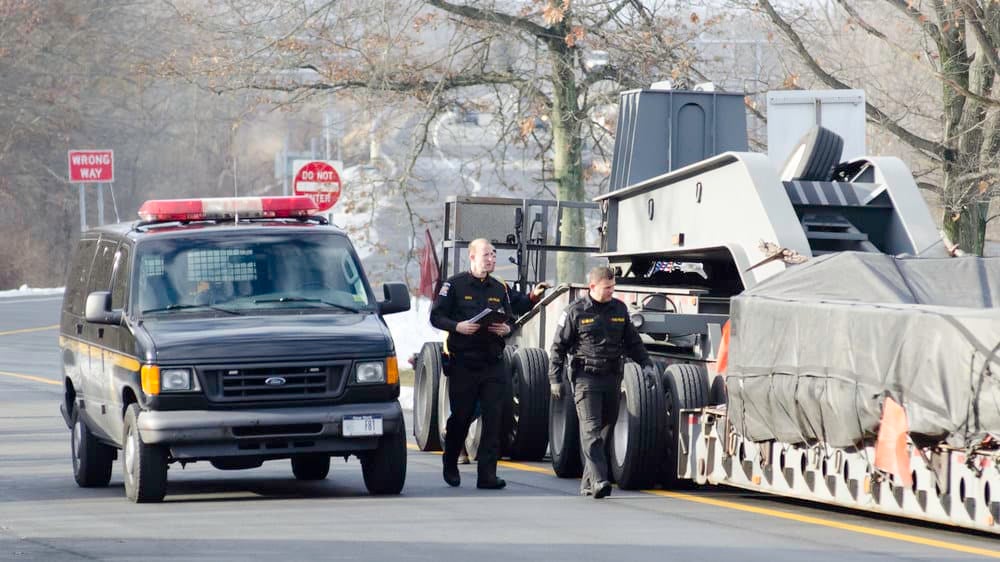
Motor carriers may want to double-check the condition of their trailers’ rear impact guards before hitting the highways in early June.
That’s because approximately 9,000 inspectors in North America will be checking to ensure trailer underride guards meet federal regulations as part of the Commercial Vehicle Safety Alliance’s (CVSA) annual International Roadcheck inspection blitz scheduled for June 4-6.
The agency rolled out its online training program for commercial vehicle inspectors in February, which highlights what they should be looking for when examining rear guards on trailers. The training was also available for motor carriers, said Kerri Wirachowsky, director of roadside inspection of CVSA.
“Motor carriers that receive violations for damaged, missing rear guards or those that don’t meet federal regulation will not be placed out of service, but will no longer receive a CVSA decal during the 72-hour enforcement period,” Wirachowsky told FreightWaves.
A motor carrier with a damaged rear guard faces a fine, which varies by jurisdiction, and will be assessed two points on its Compliance, Safety, Accountability, or CSA score, she said. CSA is the safety compliance and enforcement program of the Federal Motor Carrier Safety Administration, or FMCSA.
This is a change from the enforcement agency’s current policy, but the decision was based on a vote by CVSA’s board of directors at its fall conference.
Not having a CVSA decal will have minimal impact on a carrier’s ability to operate throughout North America, but could mean that the same tractor-trailer may face multiple inspections during the three-day blitz.
The decal serves as a screening tool for inspectors, Wirachowsky said.
“Having the CVSA decal in the truck and trailer serves as a signal to commercial vehicle inspectors in other jurisdictions that a previous inspector found no critical inspection violations,” Wirachowsky said. “Without the decal, a truck cited for a rear underride guard violation in Michigan may be pulled over for another inspection in another state.”
The agency’s heightened focus on underrides, which are guards that prevent passenger vehicles from sliding underneath truck trailers during a crash, stems from a data-collection initiative conducted by agency inspectors in August 2018.
“During that time, I asked inspectors to take data and send it to me as to rear impact guards out there that were broken, bent or missing that violate federal regulations,” Wirachowsky said. “The data was a lot higher than I was anticipating, so it brought to light that maybe inspectors weren’t paying as close attention to the rear impact guards as they should be.”
Rear trailer guards moved up on the agency’s priority list after U.S. lawmakers approached CVSA about adding damaged or missing underride guards to the agency’s out-of-service criteria, which means the motor carrier will not be able to move until the problem is fixed.
“We aren’t convinced that we need to have out-of-service criteria for rear impact guards, but we also don’t want a violation going unnoticed if it is damaged to the extent that it no longer meets the regulation,” stated Wirachowsky.
The agency’s renewed interest in rear impact guard inspections stems from a bipartisan measure to mandate guard rails on truck trailers, called Stop Underride Act, Wirachowsky said. The bill was reintroduced March 5 in Congress by Senators Kirsten Gillibrand (D-New York) and Marco Rubio (R-Florida) as well as Representatives Steve Cohen (D-Tennessee) and Mark DeSaulnier (D-California).
The bill seeks to strengthen rear guards, which have been mandatory on trailers since 1953. However, regulations governing rear guards have not been updated since 1998. The bill would require underride guards to be fitted on the sides of trailers and on the front of trucks. Both currently are optional safety measures.
Inspectors will emphasize motor carriers’ steering and suspension systems during this year’s Roadcheck, a first for the agency, Wirachowsky explained.
“Not only do (the systems) support the heavy loads carried by trucks and buses, but they also help maintain stability and control under acceleration and braking, keeping the vehicle safely on the road,” said CVSA President Chief Jay Thompson of the Arkansas Highway Control.
There’s still no word on whether Mexico will be participating in this year’s Roadcheck, said Will Schaefer, director of safety programs of CVSA.
“Mexico hasn’t shared their inspection data the last few years, so we aren’t sure if they will collect it and send it to us this year,” Schaefer told FreightWaves.







